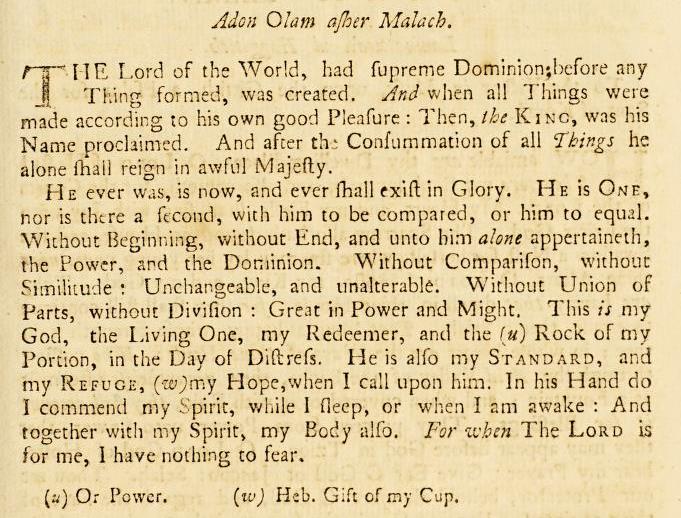אֲדוֹן עוֹלָם (מנהג הספרדים) | Adōn Olam, translation by Isaac Pinto (1766)
Source Link: https://opensiddur.org/?p=52246
open_content_license: Creative Commons Zero (CC 0) Universal license a Public Domain dedication date_src_start: 1040-00-00 date_src_end: 1100-00-00 languages_meta: [{"name":"English","code":"eng","standard":"ISO 639-3"},{"name":"Hebrew","code":"heb","standard":"ISO 639-3"}] scripts_meta: [{"name":"Latin","code":"Latn","standard":"ISO 15924"},{"name":"Hebrew (Ktav Ashuri)","code":"Hebr","standard":"ISO 15924"}] Date: 2023-08-01
Last Updated: 2025-08-12
Categories: Bedtime Shema, Morning Baqashot, Arvit l'Shabbat, Musaf l'Shabbat
Tags: 11th century C.E., 49th century A.M., cosmological, Nusaḥ Sefaradi, אדון עולם Adon Olam, פיוטים piyyuṭim
Excerpt: This is Isaac Pinto's English translation of Adon Olam from Prayers for Shabbath, Rosh-Hashanah, and [Yom] Kippur (1766), p. 29. The translation there appears without the Hebrew. The Hebrew text of the piyyut set side-by-side with the translation was transcribed from Rabbi David de Sola Pool's Tefilot l'Rosh haShanah (1937). . . .
Content:
| Source (Hebrew) |
Translation (English) |
|
אֲדוֹן עוֹלָם אֲשֶׁר מָלַךְ
בְּטֶֽרֶם כׇּל־יְצִיר נִבְרָא׃
לְעֵת נַֽעֲשָׂה כְּחֶפְצוֹ כֹּל
אֲזַי מֶֽלֶךְ שְׁמוֹ נִקְרָא׃
|
The Lord of the World, had supreme Dominion
before any Thing formed, was created.
And when all Things were made according to his own good Pleasure:
Then, the KING, was his Name proclaimed.
|
|
וְאַֽחֲרֵי כִּכְלּוֹת הַכֹּל
לְבַדּוֹ יִמְלֹךְ נוֹרָא׃
וְהוּא הָיָה וְהוּא הֹוֶה
וְהוּא יִֽהְיֶה בְּתִפְאֲרָה׃
|
And after the Consummation of all Things
he alone shall reign in awful Majesty.
He ever was, is now,
and ever shall exist in Glory.
|
|
וְהוּא אֶחָד וְאֵין שֵׁנִי
לְהַמְשִׁיל לוֹ לְהַחְבִּירָה׃
בְּלִי רֵאשִׁית בְּלִי תַּכְלִית
וְלוֹ הָעֹז וְהַמִּשְׂרָה׃
|
HE is ONE, nor is there a second,
with him to be compared, or him to equal.
Without Beginning, without End,
and unto him alone appertaineth, the Power, and the Dominion.
|
|
בְּלִי עֵֽרֶךְ בְּלִי דִמְיוֹן
בְּלִי שִׁנּוּי וְהַתְּמוּרָה׃
בְּלִי חִבּוּר בְּלִי פֵרוּד
גְּדׇל־כֹּחַ וְהַגְּבוּרָה׃
|
Without Comparison, without Similitude:
Unchangeable, and unalterable.
Without Union of Parts, without Division:
Great in Power and Might.
|
|
וְהוּא אֵלִי וְחַי גּֽוֹאֲלִי
וְצוּר חֶבְלִי בְּיוֹם צָרָה׃
וְהוּא נִסִּי וּמָנוֹס לִי
מְנָת כּוֹסִי בְּיוֹם אֶקְרָא׃
|
This is my God, the Living One, my Redeemer,
and the Rock of my Portion, in the Day of Distress.
He is also my STANDARD, and my REFUGE,
my Hope, when I call upon him.
|
|
בְּיָדוֹ אַפְקִיד רוּחִי
בְּעֵת אִישַׁן וְאָעִֽירָה׃
וְעִם רוּחִי גְּוִיָּתִי
אֲדֹנָי לִי וְלֹא אִירָא׃
|
In his Hand do I commend my Spirit,
while I sleep, or when I am awake:
And together with my Spirit, my Body also.
For when The LORD is for me, I have nothing to fear.
|
This is Isaac Pinto’s English translation of Adon Olam from Prayers for Shabbath, Rosh-Hashanah, and [Yom] Kippur (1766), p. 29. The translation there appears without the Hebrew. The Hebrew text of the piyyut set side-by-side with the translation was transcribed from Rabbi David de Sola Pool’s Tefilot l’Rosh haShanah (1937).
Adon Olam is a piyyut that became popular in the 15th century and is often attributed to Solomon ibn Gabirol (1021–1058) and less often to Sherira Gaon (900-1001), or his son, Hai ben Sherira Gaon (939-1038). The variation of the piyyut appearing here is the 12 line version familiar to Sepharadi congregations. (There are also fifteen and sixteen line variants found in Sepharadi siddurim. The Ashkenazi version has ten lines.)
Source(s)
Contributor: Aharon N. Varady (transcription)
Co-authors:
-

Name: Isaac Pinto (translation)
Bio: Isaac Pinto (1720–1791) was an American Jew in Colonial America who, near the end of his life, served the nascent government of the United States. Pinto prepared the first Jewish prayer-book published in America, which was also the first English translation of the Siddur (1766). A member of Congregation Shearith Israel, he served as one of the first official translators hired by the United States government in 1781 under authorization of the Continental Congress working in the Department of Foreign Affairs, the predecessor to the modern Department of State.
Website: https://en.wikipedia.org/wiki/Isaac_Pinto
Profile Link: https://opensiddur.org/profile/isaac-pinto
-

Name: Shlomo ibn Gabirol
Bio: Shlomo ibn Gabirol (also Solomon ben Judah; Hebrew: שלמה בן יהודה אבן גבירול, Arabic: أبو أيوب سليمان بن يحيى بن جبيرول Abu Ayyub Sulayman bin Yahya bin Jabirul, Latin: Avicebron or Avencebrol; 1021/22-1058), born in Malaga, Spain was an Andalusian poet and Jewish philosopher. He published over a hundred poems, as well as works of biblical exegesis, philosophy, ethics, and satire.
Website: https://en.wikipedia.org/wiki/Solomon_ibn_Gabirol
Profile Link: https://opensiddur.org/profile/shlomo-ibn-gabirol
-

Name: Aharon N. Varady (transcription)
Bio: Aharon Varady (M.A.J.Ed./JTSA Davidson) is a volunteer transcriber for the Open Siddur Project. If you find any mistakes in his transcriptions, please let him know. Shgiyot mi yavin; Ministarot naqeni שְׁגִיאוֹת מִי־יָבִין; מִנִּסְתָּרוֹת נַקֵּנִי "Who can know all one's flaws? From hidden errors, correct me" (Psalms 19:13). If you'd like to directly support his work, please consider donating via his Patreon account. (Varady also translates prayers and contributes his own original work besides serving as the primary shammes of the Open Siddur Project and its website, opensiddur.org.)
Website: https://aharon.varady.net
Profile Link: https://opensiddur.org/profile/aharon-varady-transcription
Featured Image:

Title: Adon Olam Asher Malakh (trans. Isaac Pinto 1766)
Caption: Adon Olam Asher Malakh (trans. Isaac Pinto 1766)



